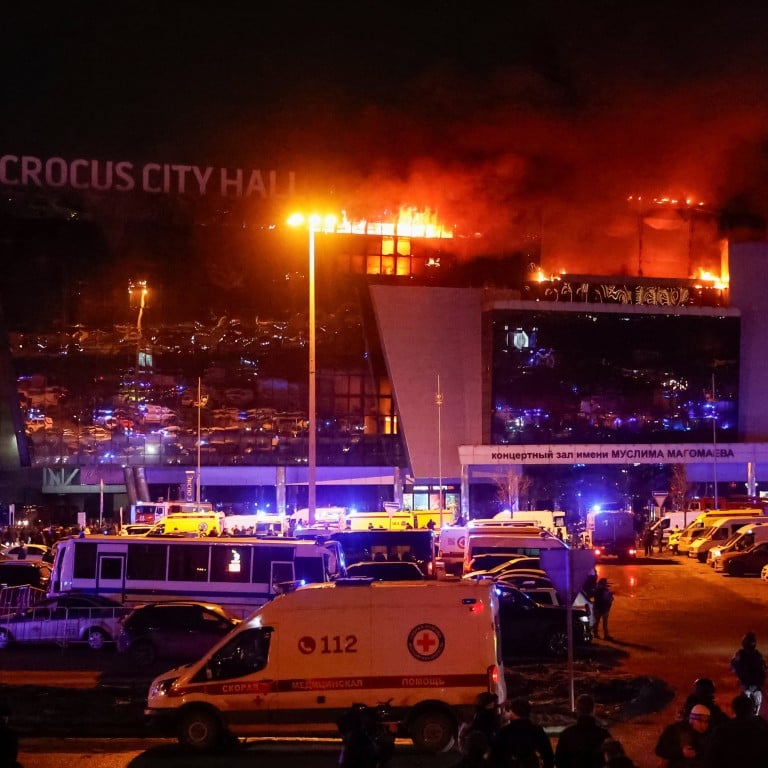
China’s Xi Jinping condemns Moscow shooting as ‘severe terrorist attack’ in message to Vladimir Putin
- Chinese president’s message to Russian counterpart shows Moscow can expect Beijing to ‘stand in solidarity’ with it on security, analyst says
- The Islamic State claims responsibility for attack at concert hall that killed 143
Xi expressed his shock about the “severe terrorist attack” and sent “deep and sincere condolences” to victims and their families on behalf of the Chinese government and people.
Moscow concert hall attack: 11 suspects detained after gunmen kill 115
There were no reports of Chinese casualties in the shooting, Beijing’s embassy in Russia said on Saturday morning, adding that it was continuing to monitor the incident.
According to Andrew Korybko, a Moscow-based international relations expert, China’s response was “what one would expect after a major terrorist attack”.
“Its statement of support for whatever Russia needs to do to maintain national security aligns with the spirit of their strategic partnership,” said the scholar from the Moscow State Institute of International Relations.
“Moscow can expect Beijing to stand in solidarity with it,” Korybko said, adding that China would not criticise Russia or “spread conspiracy theories” about the incident.
Chinese citizens who were at or near the scene have shared their experiences.
Chen Yiming, a Chinese student at Saint Petersburg State University, said he was at a restaurant in the same Moscow commercial complex as the concert hall when the attack took place.
“I was in a restaurant thinking of what to order. Then I heard a loud explosion, which was too loud to go unnoticed,” Chen told state-owned news outlet The Paper.
“I was shocked, totally clueless of what had happened. At first I thought it might be a drone attack. Then I heard [gunshots] like firecrackers being set off.”
Later Chen joined the panicked crowd and ran. He said he heard girls scream and saw people fall along the way. He safely escaped the complex and sought shelter under a bridge. It was not until he checked the news on his mobile phone that he found out what had happened.
Police arrived in 10 or 20 minutes, Chen was quoted as saying. Residential and high density-areas were put on high alert, with residents in fear as the number of terrorists at large was unknown, he said.
A student surnamed Yang told the Post that friends and family told him to avoid going out and to refrain from visiting crowded places.
Other Chinese students posted on lifestyle platform Xiaohongshu about feeling scared after learning about the news and hearing “police cars wailing” near their residences on Friday night.
More than 44,000 Chinese students are studying in Russia, according to information released by the Russian government in December.
Several Chinese entrepreneurs and traders shared their safety concerns on Xiaohongshu and discussed whether they should postpone business trips to the city, as many had planned to visit Crocus Expo, an exhibition centre next to the concert hall where the shooting happened.
The Russian embassy in China expressed gratitude to Chinese social media users who sent condolences for the victims and their families. On its official Weibo account, the embassy wrote: “We’ve received the condolences from the Chinese people. Thank you for your support!”
‘The crowds were chaotic’: how the gun attack at Moscow concert unfolded
Korybko noted that “no Chinese interests – economic or political – were affected by this attack”, unlike an attempted attack on Wednesday at the Chinese-built Gwadar Port Authority complex in Pakistan, where eight terrorists were killed by Pakistani security forces.
“That town is the terminal point of the China-Pakistan Economic Corridor (CPEC), a flagship project of the Belt and Road Initiative that boasts an estimated US$60 billion investment,” said Korybko. “If China increases security spending on any of its foreign investments in the coming future, it would be the CPEC.”
If Russian authorities find that Islamic State Khorasan (Isis-K), Islamic State’s affiliate in Afghanistan, was indeed behind the Moscow attack as it has claimed, then “closer Russian-Chinese security and intelligence cooperation in Afghanistan and Central Asia can be expected”, Korybko added.
“Russia will remain stable even in the worst-case scenario that there are more attacks in the coming future.”
Putin’s re-election will allow him to rule until at least 2030, when he will be 77, making him Russia’s longest-serving leader since Soviet leader Joseph Stalin.
“It’s a warning to Putin before he starts the new term,” Hu wrote on Weibo.
“The attack would deteriorate the situation in Russia. It intensifies people’s impression – Moscow is not safe any more. Russian areas, even for those far away from the battlefields in its war with Ukraine, could become attack targets. In many places, defence is weak and even nonexistent,” he wrote.



